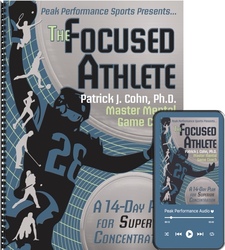
What is the Key to Performing at your Peak?
Summary: Learn how to balance confidence and expectations to perform at your best in sports. While confidence fuels peak performance, excessive expectations can create pressure and distract from focus. This guide explains how athletes can manage high expectations, focus on controllable factors like effort and mindset, and trust their training to achieve optimal results. Featuring insights from Olympic gold medalist Masai Russell, discover practical strategies to stay calm, steady, and confident during competitions.
Of course, you need to be confident. Confidence helps you accomplish a lot in your sport. However, for some athletes, crushing it at a high level can increase the pressure to stay on top or perform consistently at a high level.
High expectations from the outside world and within themselves can cause athletes to feel they are supposed to win or achieve a personal best every time they compete.
When you have excessively high expectations before competing, distracting thoughts swirl in your mind that detract from your preparation, focus, and performance.
While you need to be confident in your ability to win, you must also temper your expectations. Confidence fuels performance while excessive pressure interferes with it.
Managing your expectations allows you to focus on executing your skills rather than obsessing over outcomes. One thing necessary to understand is that outcomes are not entirely under your control.
Therefore, managing expectations is essential for peak performance. You can temper expectations by focusing on controllable factors such as effort, execution, and mindset.
Weight of Expectations
Certain thoughts can alert you that your expectations are excessively high. For example, “I need to win since I’m seeded first,” “What will others think of me if I lose,” or “My team expects me to be the best player on the field.”
These early warning signs can inform you that it’s time to switch your focus.
You can switch your focus away from outcomes by focusing on pre-competition routines, reminding yourself that outcomes are not fully under your control, or telling yourself, “I’ve prepared my best, let ‘s just see what happens.”
The key is to prepare your best, which helps you be confident in your abilities. The next step is to get out of your own way by letting go of your expectations, trusting your training, and putting forth your best effort.
Prepare Like an Olympian
Olympic gold medalist Masai Russell ran the second-fastest 100m hurdles time in history to open the 2025 Grand Slam Track Miami meet on Friday. Russell won in 12.17 seconds, five hundredths shy of the world record. Russell was highly confident heading into the track meet.
RUSSELL: “I continue to say I’m one of the best hurdlers ever. I’m going to always stand by that.” However, Russell understood that excessively high expectations can hold you back from competing freely and performing at your highest level.
RUSSELL: “I didn’t expect that, but I just went out there and competed. It shows when you turn your brain off and compete, you don’t know what you’re capable of.”
Performing at your peak requires confidence and tempered expectations. While confidence lays the groundwork for peak performance, managing expectations keeps you steady, calm, and focused during challenging competitions, allowing your talents and training to show forth.
Before every competition, examine your thoughts and determine if your expectations are problematic. If your expectations are too high, refocus on what you can control: your effort, your focus, and your attitude.
Tips for Managing Expectations and Boosting Performance
- Focus on Controllables
Concentrate on factors you can control: effort, execution, mindset, and preparation. Outcomes aren’t fully under your control, so shift attention to what you can influence. - Recognize Warning Signs
Notice thoughts like, “I have to win” or “What will others think if I lose?” These indicate expectations may be too high, signaling it’s time to refocus. - Use Pre-Competition Routines
Rituals like visualization, warm-ups, or mental cues help calm the mind, keep you present, and reduce pressure to perform perfectly. - Practice Self-Talk
Remind yourself: “I’ve prepared my best; now let’s see what happens.” Positive self-talk reinforces confidence while reducing anxiety. - Trust Your Training
Confidence grows from preparation. Commit fully to your training and trust your abilities when competition begins. - Detach from Outcomes
Focus on performing each step well rather than obsessing over results. Letting go of expectations frees your mind to compete at your highest level. - Learn from Role Models
Study athletes like Masai Russell, who perform under pressure by turning off overthinking and trusting their preparation.
FAQ – Managing Expectations and Confidence in Sports
Q1: Why is managing expectations important for athletes?
A: Excessive expectations can create pressure, distract focus, and interfere with performance. Managing expectations allows athletes to concentrate on controllable factors like effort, execution, and mindset.
Q2: How can I stay confident without feeling pressured to win every time?
A: Focus on preparation, trust your training, and remind yourself that outcomes aren’t fully under your control. Confidence comes from knowing you’ve done your best.
Q3: What are signs my expectations are too high?
A: Thoughts like “I must win” or “What will others think if I lose?” indicate expectations may be excessive and it’s time to refocus on effort and preparation.
Q4: How can I reduce pressure before competition?
A: Use pre-competition routines, positive self-talk, and visualization to stay calm and focused. Remind yourself, “I’ve prepared my best; now let’s see what happens.”
Q5: Can focusing on outcomes hurt performance?
A: Yes. Obsessing over results increases stress and reduces mental clarity. Concentrate on performing each step well, which naturally improves outcomes.
Q6: How do elite athletes handle high expectations?
A: Top athletes, like Olympic gold medalist Masai Russell, focus on preparation, trust their training, and “turn off” overthinking during competition to perform freely at their highest level.
Related Sports Psychology Article
- Annoying Sports Parents Who Yell from the Sideline
- How to Focus When Coach is Yelling – Video
- How Top Coaches Help Athletes Succeed
The Focused Athlete (Digital Download)

“The Focused Athlete” audio and workbook program helps you or your athletes overcome distractions and sharpen your concentration during competition. You learn how to get locked in during practice and competition so you can improve and perform better.
“First, I would like to thank you for the help given to me through your programs, ‘The Confident Athlete’ and ‘The Focused Athlete.’ I have made tremendous sacrifices though all these years to become a top Olympic Trap shooter but something was missing. This missing part was with my mental game. My scores increased tremendously in record time and others said that I was a different shooter.“
~Marios Kapodistria

